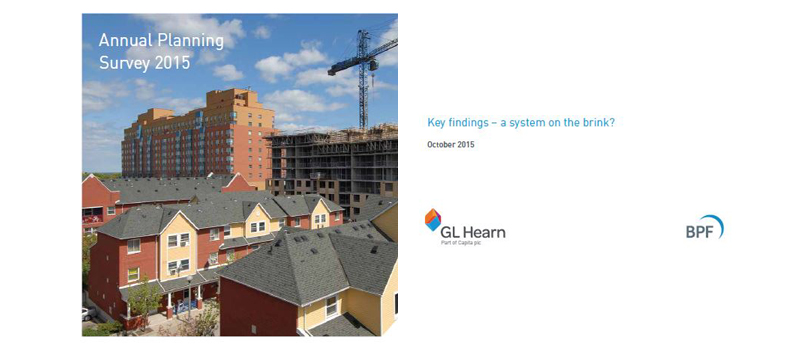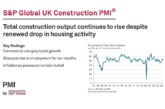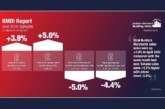
The fourth Annual Planning Survey from GL Hearn (part of Capita plc) and the British Property Federation suggests that the UK planning system is on the brink as local authorities suffer from a lack of resource.
- 55% of Local Planning Authorities (LPAs) surveyed say under-resourcing is now a significant challenge;
- Approximately two thirds (65%) of applicants happy to pay more to shorten waiting times;
- Major new planning application* determination times hit a three year high of 32 weeks, over double the government target;
- Overall volume of major planning applications determined in London down 26% when compared to 2013-14.
Some of England’s major cities are taking well over six months to determine major new planning applications with both developers and local authorities identifying a lack of resource within planning departments as a key barrier to development. The majority of developers believe higher planning fees might be part of a potential solution, helping local authorities shorten waiting times and improve performance.
The average submission to determination time for a major planning application is 32 weeks across London, Greater Manchester and Bristol and the surrounding area, over double the government target of 13 weeks. In addition to this, and despite a worsening housing crisis, the overall volume of major applications determined in London fell by 26%, according to the fourth Annual Planning Survey from the British Property Federation and GL Hearn, part of Capita plc.
“In order to get Britain building again, we need to get Britain planning. Development activity is critical for our economy, not least in order to tackle the urgent housing crisis. This year’s Annual Planning Survey shows that the planning system needs investment – and that requires action across the board.”
Both public and private sector respondents to the survey expressed concern with the lack of resources available to local planning authorities. Over half (55%) of local authorities say under-resourcing is a significant challenge and half (50%) believe the planning system is not operating as well as it was in 2010.
A significant 75% of applicants are dissatisfied with the length of time a planning application takes – up from 71% last year. The survey found that nearly two thirds (65%) of applicants would be happy to pay more if it would shorten determination times.
Key regional findings include:
- In London, the average submission to determination time is 34 weeks – 6 weeks longer than last year’s study (28 weeks) but a modest improvement from 2011/12 when it stood at 37 weeks;
- The average submission to determination time is 27 weeks in both Greater Manchester, Bristol and the surrounding area;
- The volume of major planning applications determined has fallen by 26% in London, increased by 19% in Manchester, and stayed the same in Bristol and the surrounding area;
- In line with diminishing land opportunities in the capital, densification is a more prevalent priority for applicants in London (47%) compared to applicants in the North West (14%).
Commenting on the findings of this year’s Annual Planning Survey, Shaun Andrews, GL Hearn’s Head of Investor and Developer Planning, said: “In order to get Britain building again, we need to get Britain planning. Development activity is critical for our economy, not least in order to tackle the urgent housing crisis. This year’s Annual Planning Survey shows that the planning system needs investment – and that requires action across the board.
“We need to ensure that planning authorities have the right people with the right skills and powers in place to drive forward a growth agenda – and that the system is able to release the right resources when it’s needed. For their part, developers need to speak with a single voice – and make it clear what levels of service they need and how much they are prepared to pay for it.
“There is an urgent need to find bold new solutions to this shared challenge. Further streamlining of the system may well be part of the solution but to get Britain planning to enable growth requires investment. This is an industry-wide issue that needs us all to collaborate to prevent a poorly functioning planning system stifling economic growth.”
Melanie Leech, Chief Executive at the British Property Federation, commented: “This report shows quite clearly that local authority planning departments are struggling to cope as a result of the efforts to find savings across the public sector, and that this is having a negative impact on local authorities’ ability to deliver a timely and efficient service.
“The fact of the matter is that an effective planning system is crucial to enabling regeneration and development, and if government wants to meet the housing challenge and develop the commercial buildings that support our economy, it is going to need to take action.
“The report shows that there is potentially scope for the private sector to plug this gap, and we urge the government to begin a dialogue with the property industry to see how this might be taken forward.”
To view the Annual Planning Survey from GL Hearn (part of Capita plc) and the British Property Federation, click here.
*Major new planning applications determined in 2014/15 have been reviewed for 47 Local Planning Authorities (33 in London, 10 in Greater Manchester and 4 in Bristol and surrounding area). Major new planning applications were defined as full applications of ‘10 or more dwellings / 0.5ha or more for residential development; and 1,000 sqm / 1 hectare or more for commercial development’. This excludes s73 amendments, which the report has not considered to be ‘new’ planning applications.









